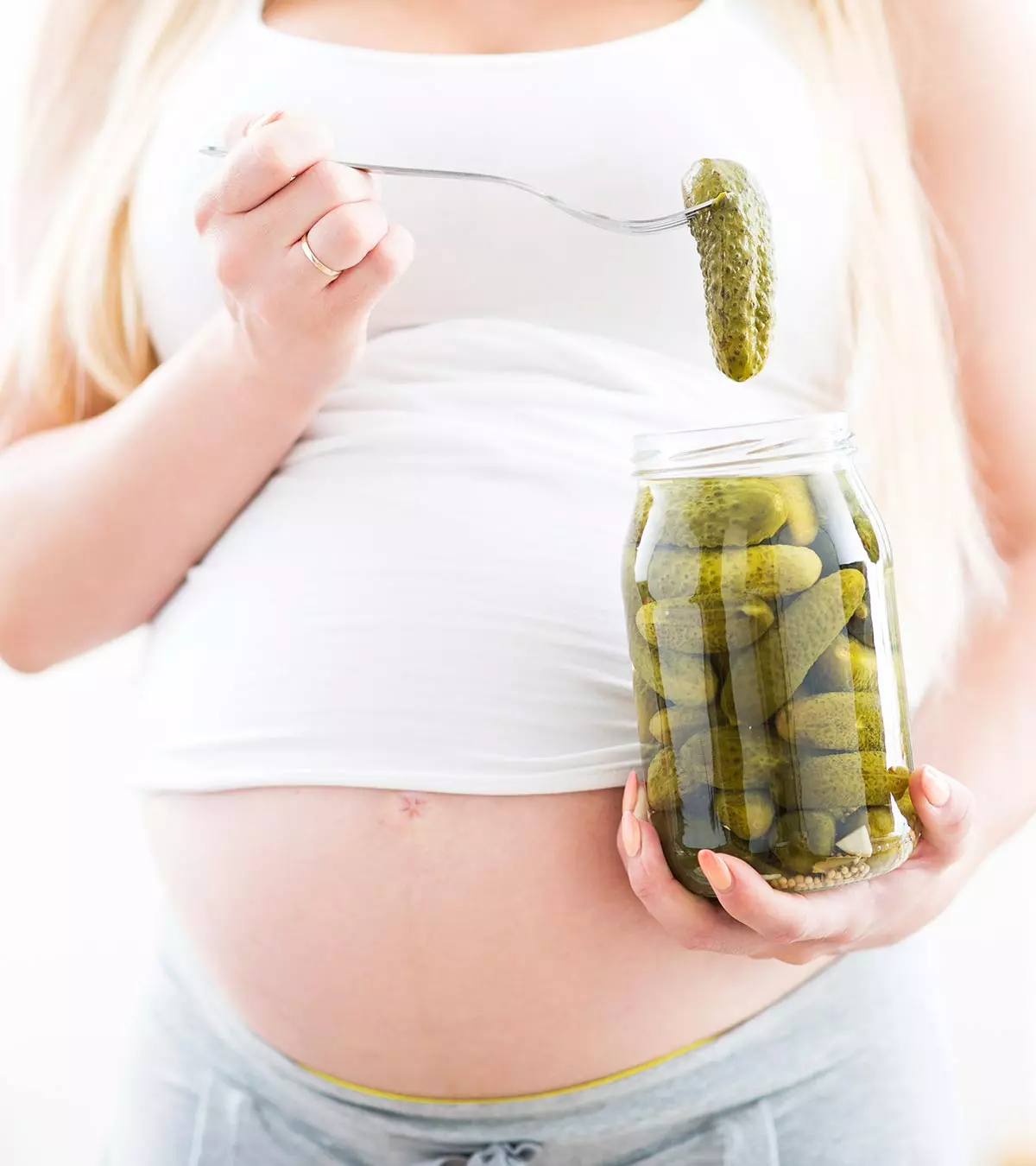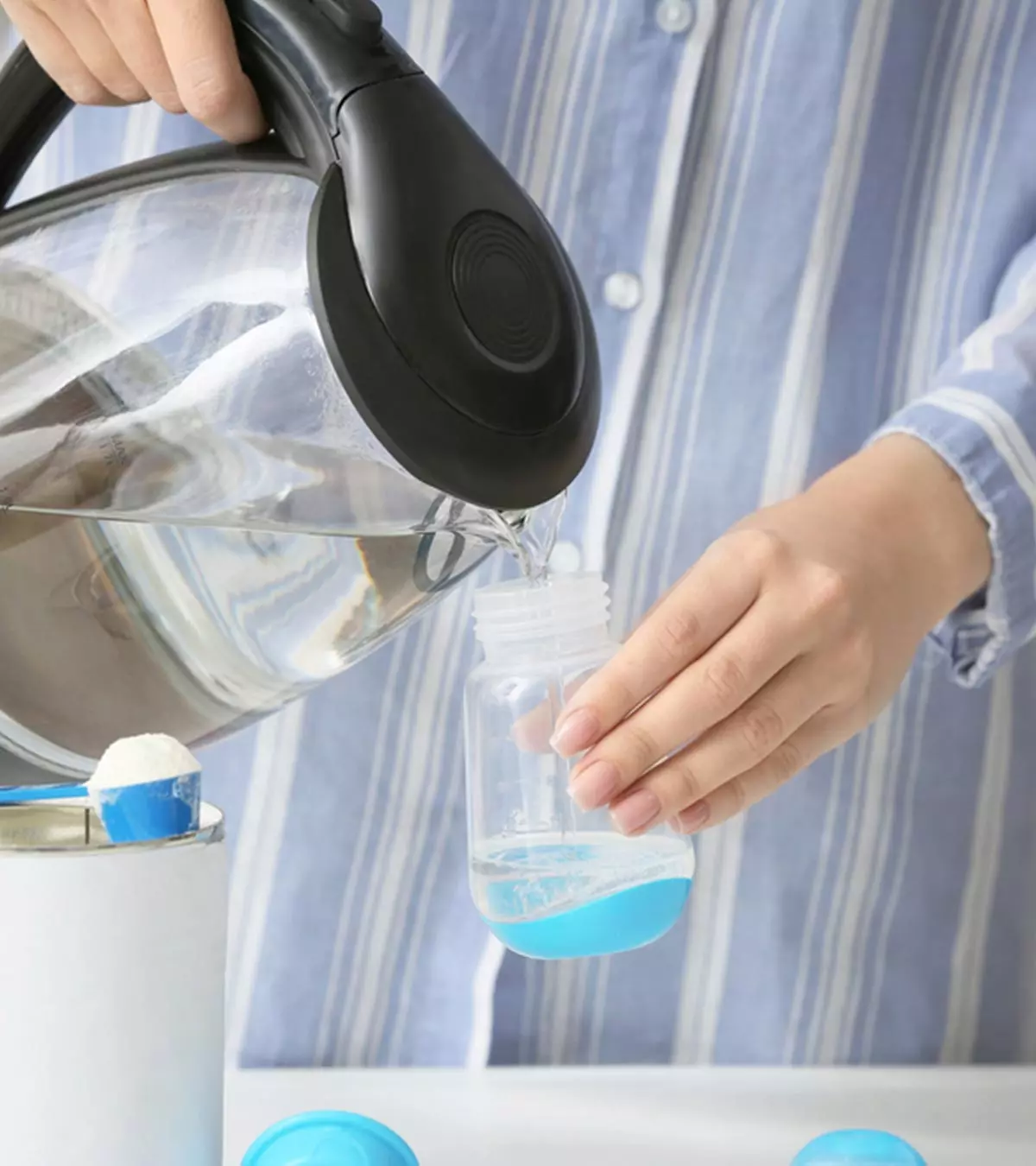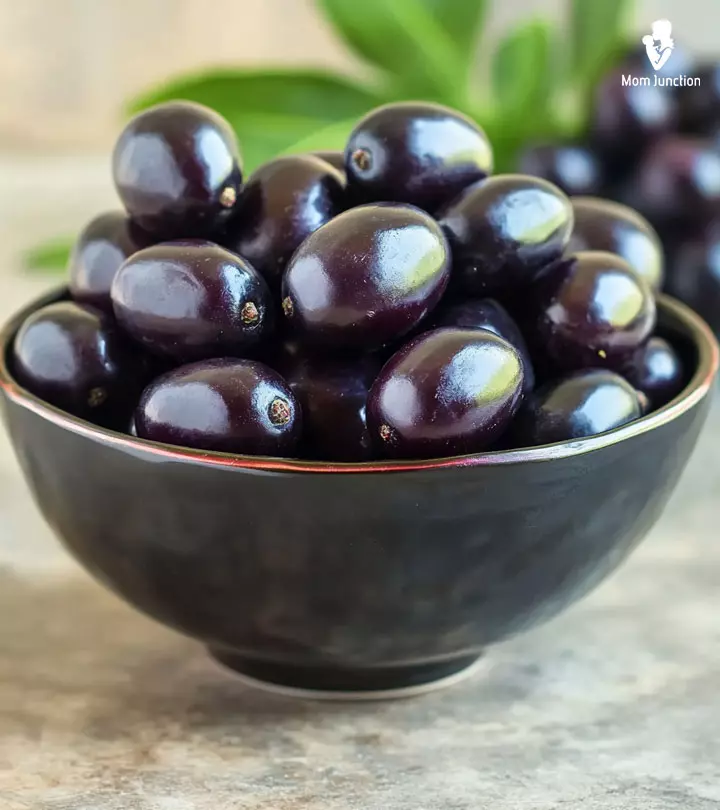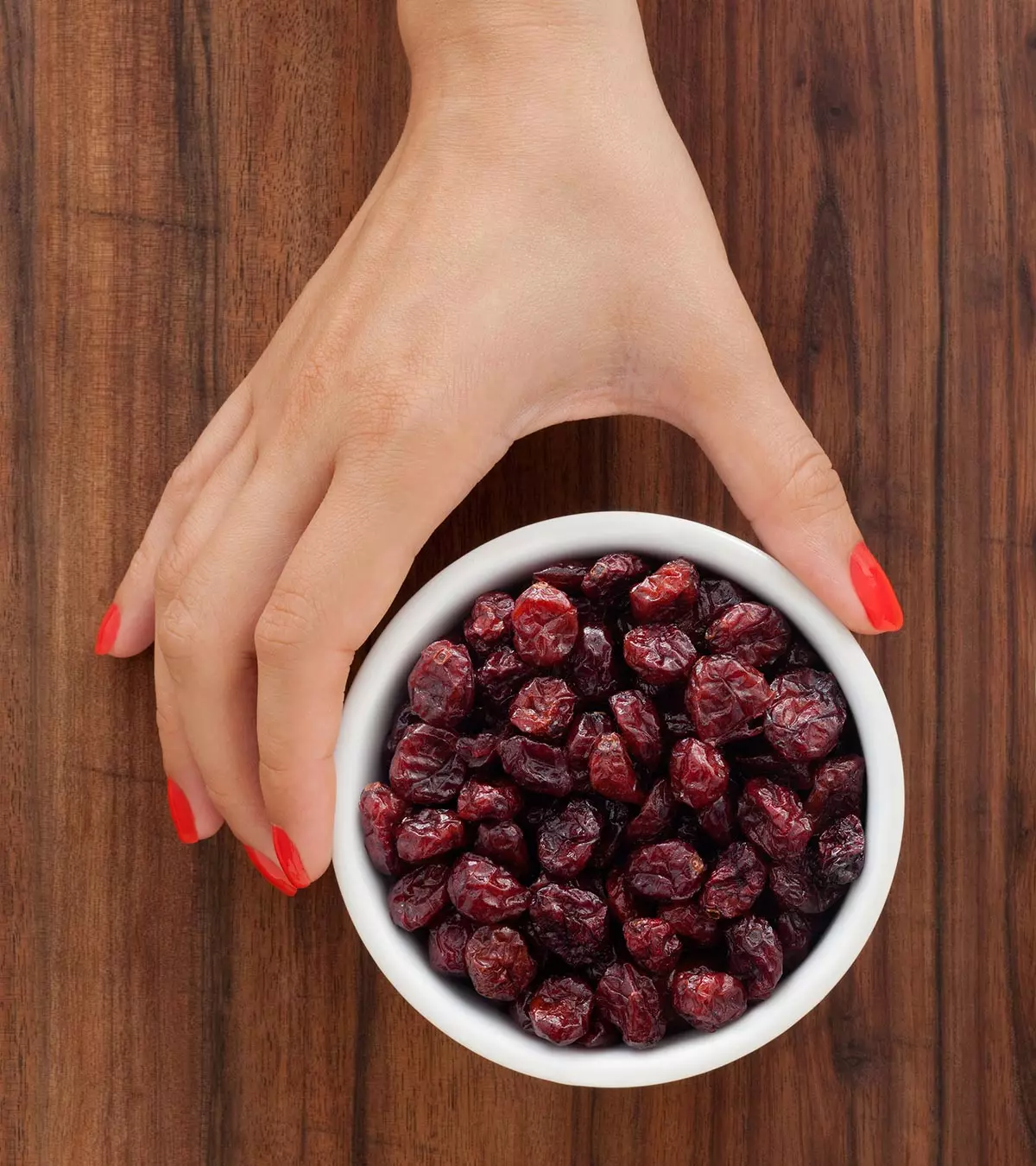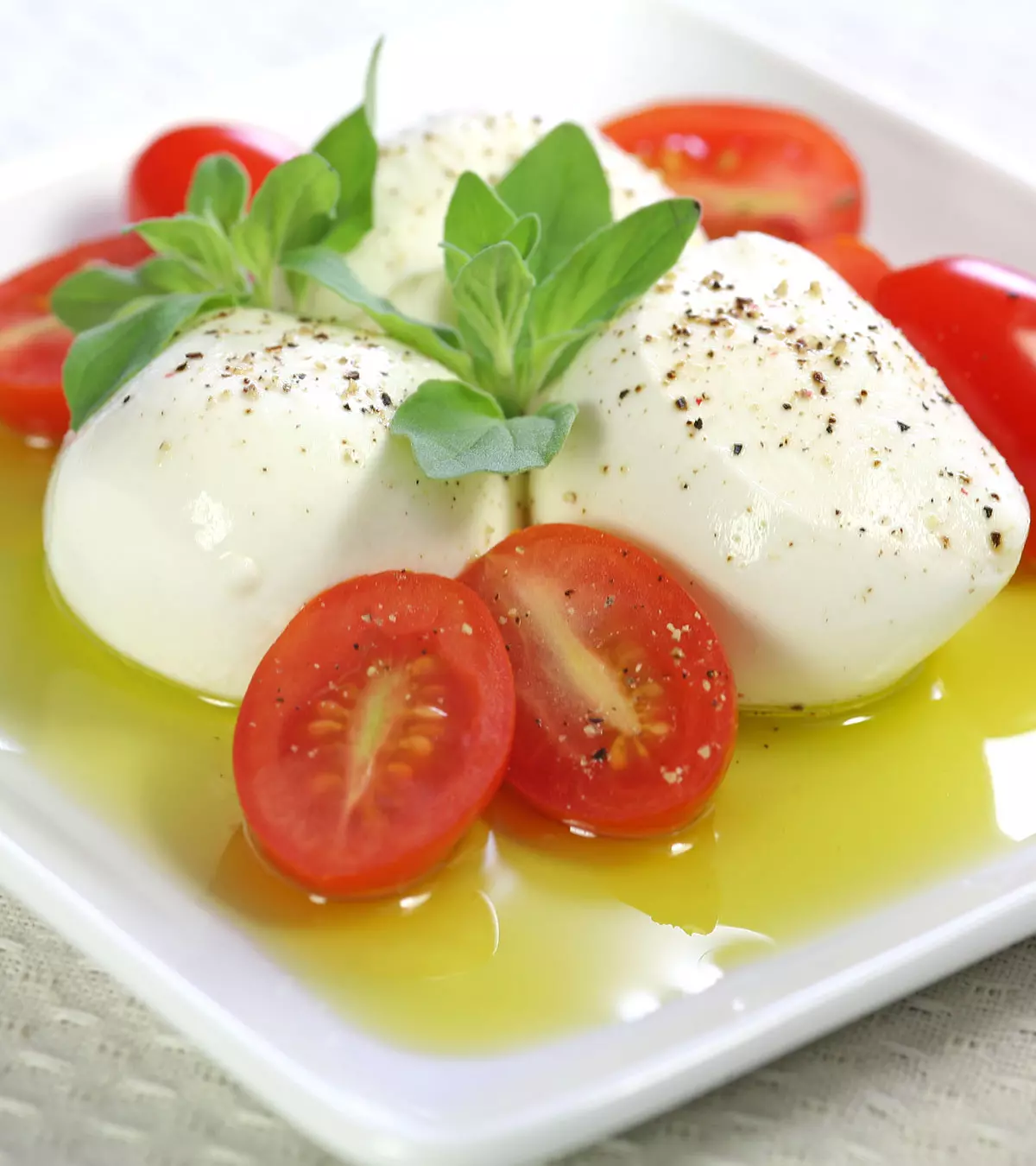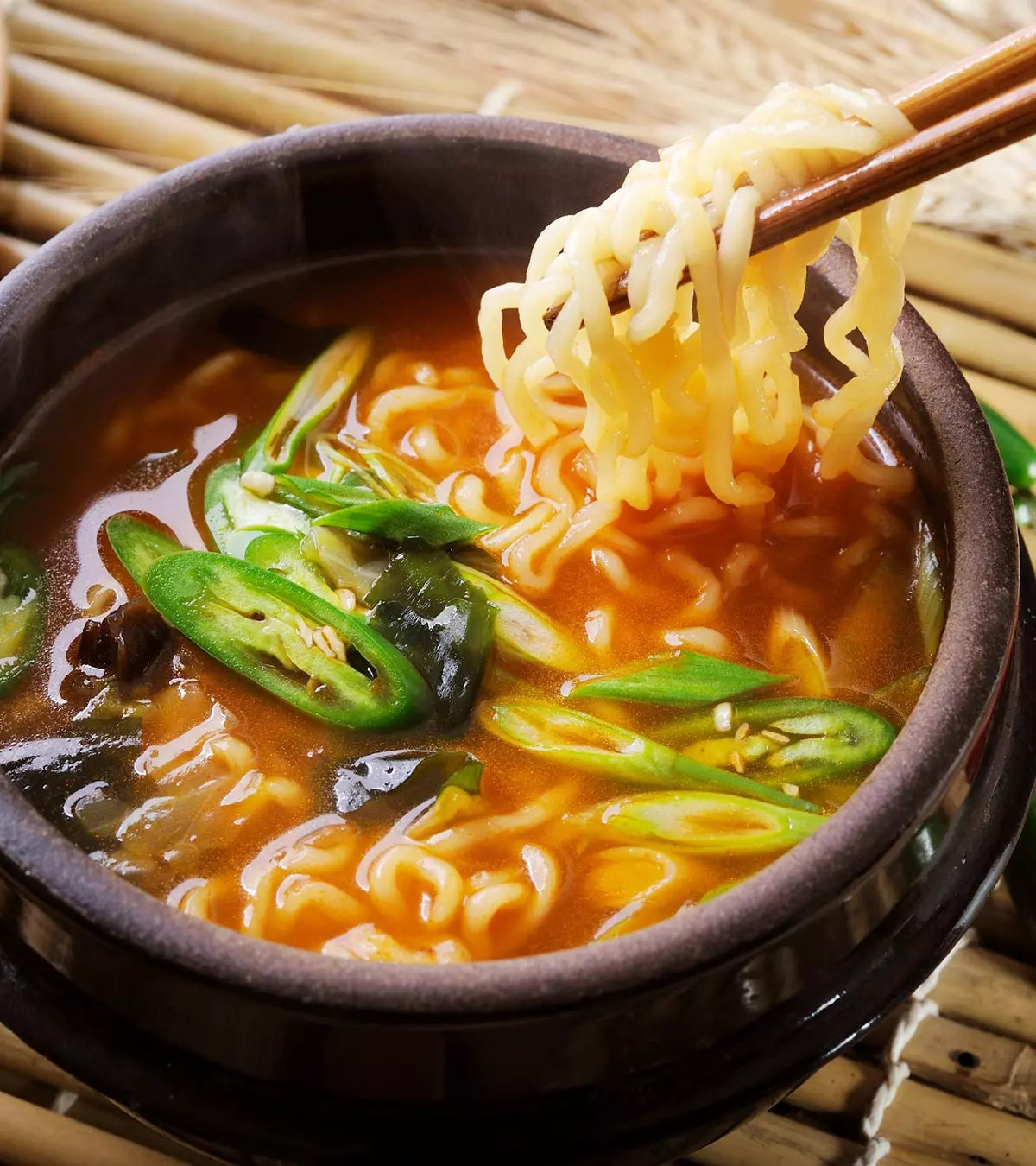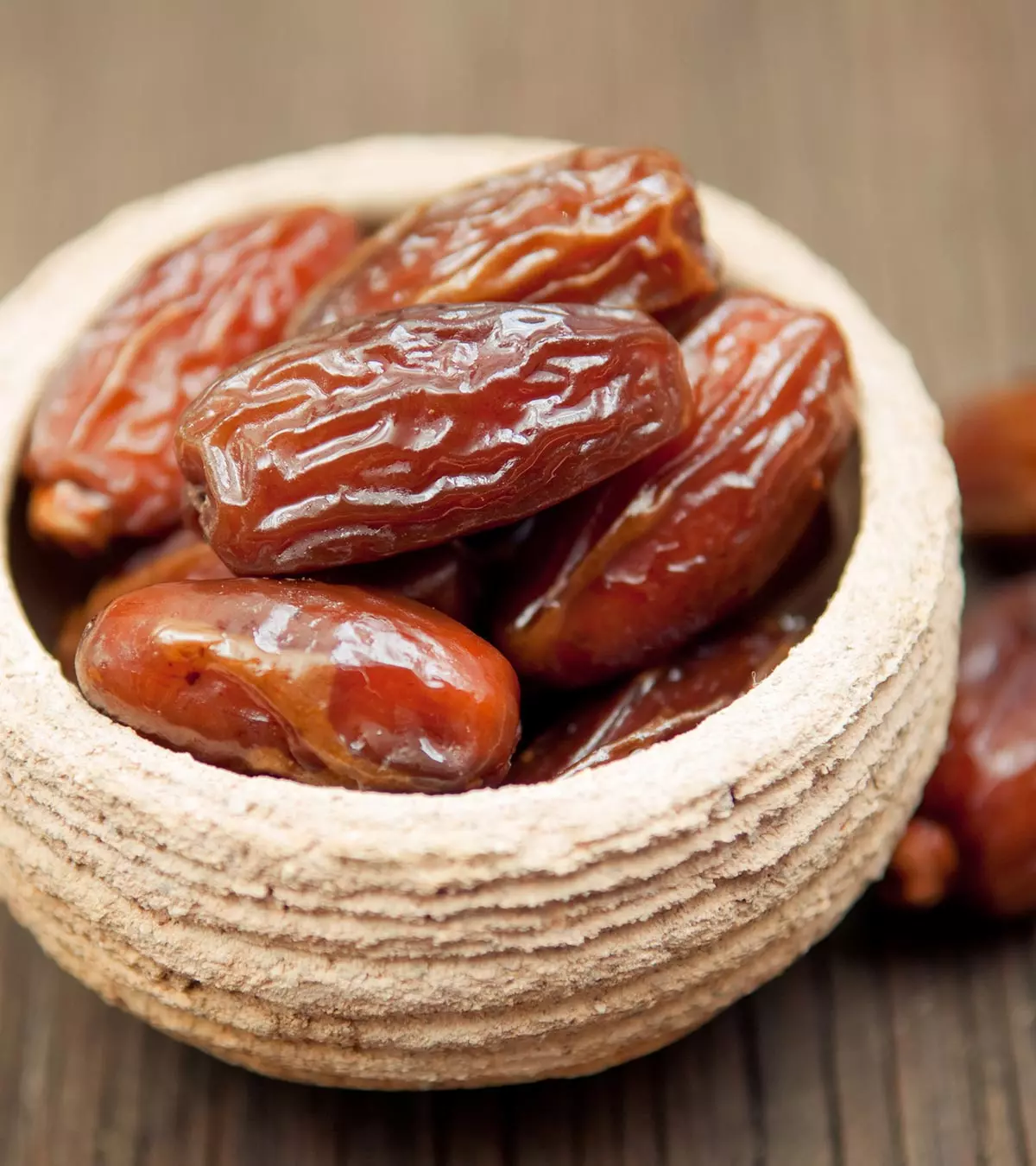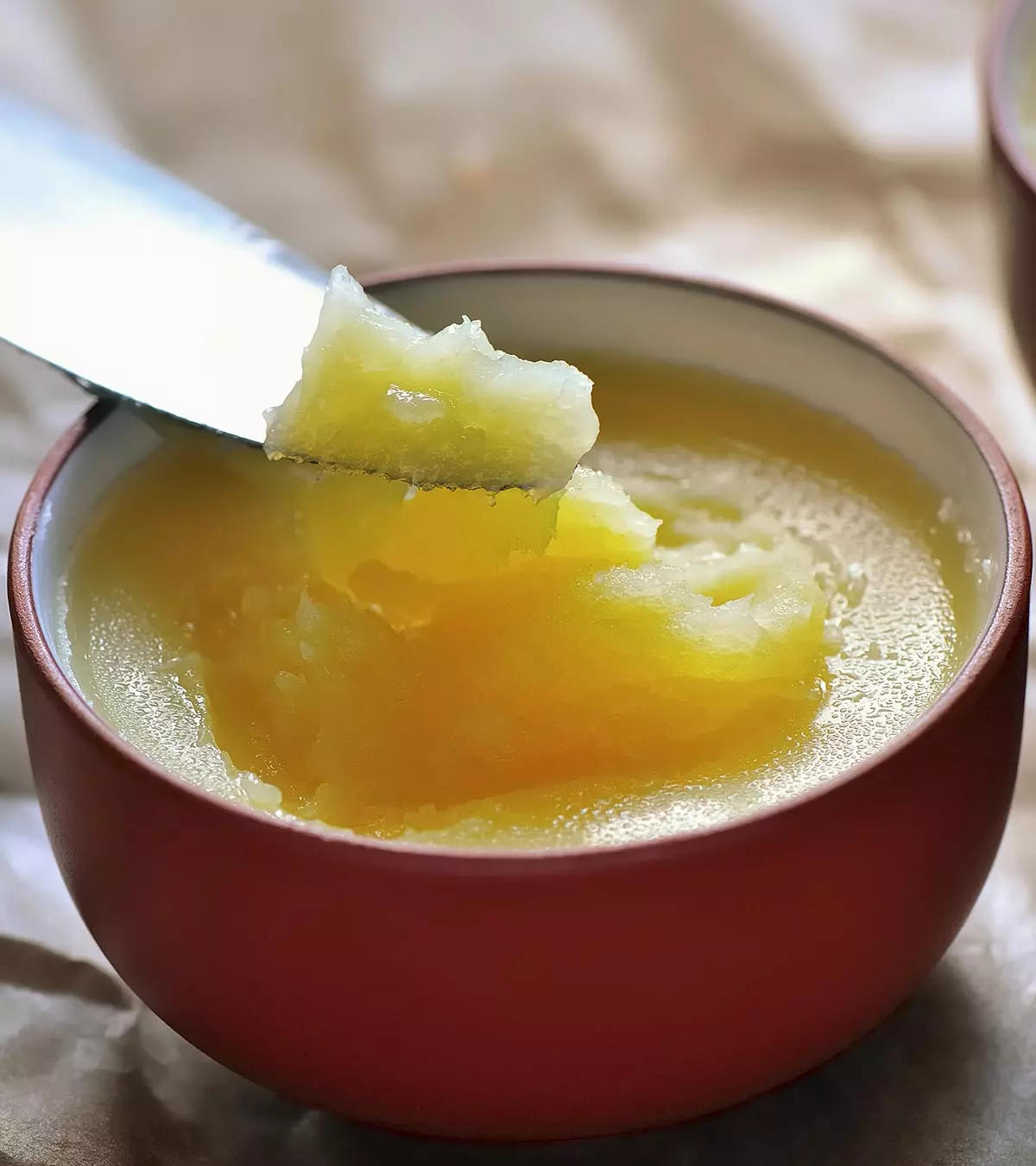
Image: Shutterstock
Ghee refers to clarified butter obtained from cow, buffalo, or mixed milk. The milk product is well known for its culinary and medicinal uses, but further research is required to ascertain the benefits of ghee for babies. Ghee mainly contains milk fats, healthy fats, low amounts of fat-soluble vitamins, and a few minerals (1).
Keep reading this post to know more about including ghee in your baby’s diet, when to introduce it, its nutritional value, and precautions to take.
Key Pointers
- Ghee is a type of clarified butter made from buffalo, cow, or mixed milk, and is commonly used in cooking and medicine.
- Babies can start consuming ghee at six months of age, but if they have a milk allergy or lactose intolerance, it is important to consult a doctor first.
- While there is no set limit for ghee intake in babies, it is generally recommended to limit consumption to one teaspoon per day for children under 12 months.
- Health benefits of ghee for children include promoting healthy weight gain, aiding in digestion, improving bone strength, and boosting immunity.
- Overconsumption of ghee can lead to weight gain, indigestion, and loss of appetite.
When Can You Introduce Ghee To Your Baby’s Diet?
Babies can start consuming ghee from the age of six months. In fact, it is one of the common dietary fats added to baby food in some countries. Ghee is available in various types like cow ghee, buffalo ghee, and mixed milk ghee (1). Cow ghee is considered ideal for use for babies as it is gluten-free in its natural state.
In case of lactose intolerance or milk allergy in infants, consult a doctor before introducing ghee to your baby (2).
 Point to consider
Point to considerHow Much Ghee Can You Give To Babies?
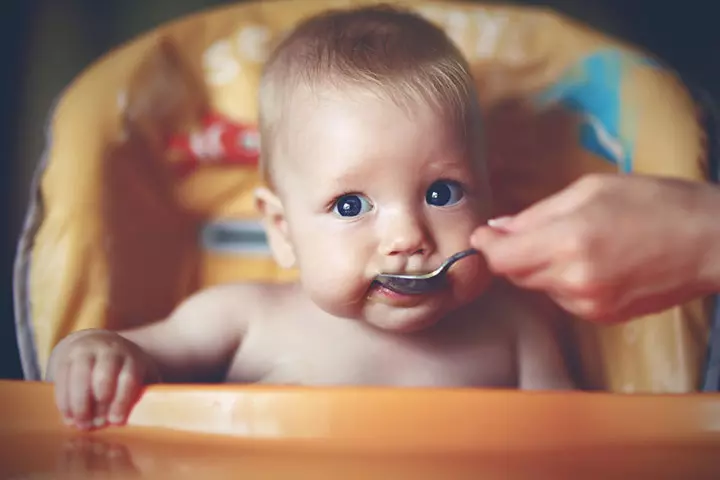
Image: IStock
There is no set limit of ghee intake for babies. In general, babies under the age of 12 months can consume one teaspoon of ghee every day. This amount then can be gradually increased to two teaspoons to a tablespoon a day. However, remember that it is not important to start babies on a specified amount of fat as they will get it from mother’s milk and fat that goes in other cooking methods.
You can consult your baby’s pediatrician or a pediatric dietician to determine the safe limit of ghee for your baby’s age.
Nutritional Value Of Ghee
Ghee is an anhydrous milk product that contains 99.8% milk fat
. One tablespoon of ghee provides the following nutrients to your baby on a per-day basis (3) (4).
| Name | Amount | RDA |
|---|---|---|
| Energy | 112Kcal | – |
| Total lipid (fat) | 12.7g | |
| Calcium, Ca | 0.512mg | 270mg (7-12 months) |
| Phosphorus, P | 0.384mg | 275mg (7-12 months) |
| Potassium, K | 0.64mg | 700mg (7-12 months) |
| Sodium, Na | 0.256mg | 200mg (7-12 months) |
| Choline, total | 2.85mg | 150mg (7-12 months) |
| Vitamin A, RAE | 108µg | 375RE |
| Vitamin K (phylloquinone) | 1.1µg | 10µg |
| Fatty acids, total saturated | 7.93g | – |
| Fatty acids, total monounsaturated | 3.68g | – |
| Fatty acids, total polyunsaturated | 0.473g | – |
| Cholesterol | 32.8mg | – |
Sources: U.S. Department of Agriculture and World Health Organization
Health Benefits Of Ghee For Babies
Below is a list of some potential benefits that your baby could reap by regular consumption of ghee.
- Easy to digest: The preparation of ghee reduces the lactose and casein content of the milk. It might make ghee easier to digest for babies with lactose intolerance.
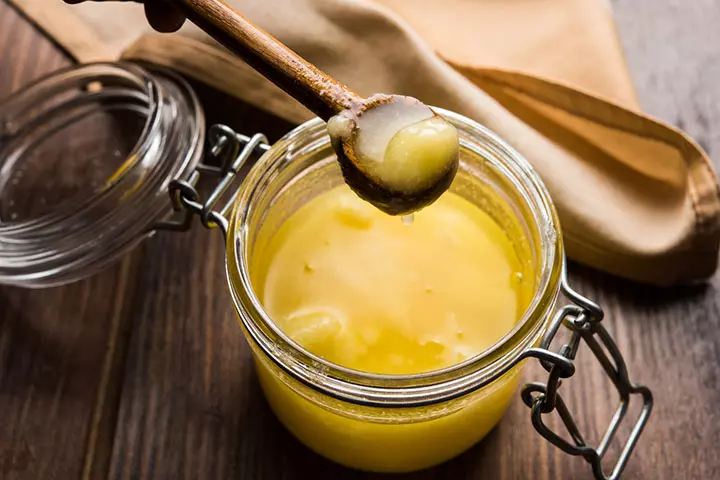
Image: IStock
- Condensed source of energy: One tablespoon of ghee provides 112Kcal of energy. This makes ghee a good source of energy for growing babies.
- Healthy weight gain: When consumed in controlled amounts regularly, ghee might help in healthy weight gain. Ghee contains conjugated linoleic acidiA fatty acid found in meat and dairy products with numerous health benefits. (CLA), which is found in milk and meat products. Studies have shown that CLA can reduce adipose massiA connective tissue extending throughout the body, consisting of fats and supporting or protecting organs. and improve bone mass (5). This attribute might facilitate healthy weight gain in babies and optimum baby health.
- Nutrient-dense: When consumed with a balanced diet, ghee could provide considerable amounts of fat-soluble vitamins, such as vitamin D and vitamin K. Ghee obtained from grass-fed cow’s milk contains a high amount of vitamin K2. Additionally, it also contains fair amounts of vitamins A and E (6). The presence of vitamin E in ghee makes it one of the most powerful sources of antioxidants in food. It also provides vital bioactive compounds such as CLA, SCFAs, and MCFAs, i.e., short-chainiFatty acids formed in the large intestines by friendly bacteria, involved in intestinal cell growth and antimicrobial activity. and medium-chain fatty acidsiFatty acids that regulate metabolism in the body, found in foods such as coconut oil and milk. The presence of healthy fats and essential fatty acids helps to establish optimum heart health and lower the level of serum cholesterol.
- Bone health: Conjugated linoleic acid (CLA) found in ghee can help improve bone mass, and therefore aids in bone development and muscle development. Ghee is also a source of vitamin D and calcium, which are essential for maintaining healthy bones, thereby being a natural nutritional supplement (7) (8).
- Digestive health: Ghee enhances the availability of MCFAs (medium-chain fatty acids) that are considered supportive in maintaining digestive health. Adding a teaspoon of ghee in your baby’s diet might help in the healthy development of the digestive system (1).
- Immunity: Cow ghee is known to possess immunomodulatory properties. These properties are attributed to the presence of a type of lipids called sphingolipids. These play a positive role in supporting the immune system by assisting the maturation of the gut (9).
- Cognitive development: Cow ghee contains DHA, cholineiAn vital nutrient found naturally in some foods, involved in the functioning of the brain, muscles, and cell repair. , and sphingolipids that play an essential role in improving cognitive function and brain development (1) (10).
- Antimicrobial effect: In alternative and traditional medicine, cow ghee is used for the treatment of various ailments, alone and in combination with other natural remedies. This is owing to the presence of phospholipids, which upon digestion, exhibit antimicrobial properties (1).
- A comprehensive global study by multiple researchers found that the estimated prevalence of eczema is 12.1% among those aged between six months and six years. If you are considering home care remedies to alleviate this skin condition in your baby, incorporating ghee into their diet could be helpful. Additionally, in Ayurveda, oral consumption of ghee is believed to improve skin health and help manage skin conditions like eczema (11). Consult a pediatrician before using ghee to treat your baby’s eczema.

Image: Shutterstock
Consumption of ghee might be beneficial, but it also has its share of potential health risks.
 Things to know
Things to knowPossible Side-Effects Of Ghee For Babies
When consumed in moderation, ghee seldom creates any health issues. Below are some possible side-effects of excess consumption of ghee.
- Increased weight: Regular over consumption of ghee could cause a baby to gain excess calories, which can lead to weight gain. In the long run, it might increase the risk of childhood obesity.
- Indigestion and loss of appetite: Over consumption of ghee is associated with indigestion and loss of appetite as it might keep the stomach full for longer.
Observing precautions while serving ghee to your baby can help avoid any adverse effects. If your baby shows signs such as excessive crying, rashes, or gastrointestinal discomfort after eating ghee, consult your pediatrician.
Precautions To Take While Giving Ghee To Babies
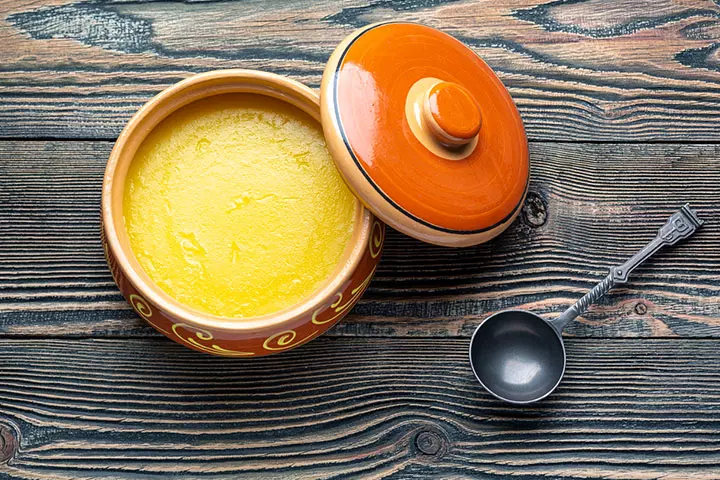
Image: IStock
The following measures could help in the safe intake of ghee for the baby.
- Prefer homemade ghee. If it is not possible for you to prepare ghee at home, then purchase fresh organic ghee.
- Feed ghee in moderate amounts only.
- If your baby shows any signs of intolerance, discontinue feeding ghee.
- If your baby regularly experiences indigestion, then stop giving ghee and observe for a few days.
- Avoid using ghee if your baby has jaundice, hepatitis, or any other liver disorder.
- As per Ayurveda, you must avoid using ghee during cold and cough.
Remember, ghee can be beneficial when it is made a part of the baby’s balanced diet.
How To Prepare Homemade Ghee For Babies
Making ghee at home requires just a couple of ingredients and correct technique. Below we explain how to make ghee at home in a few simple steps.
You will need:
- 1-2 cups of unsalted butter (For best results, ensure the butter used is unsalted and preferably organic)
How to:
- In a medium sized pot, place the butter and melt it over medium-low heat. Let it simmer for a few minutes. Try not to stir the melted butter. You may also see foam in the pot.
- After 2-5 minutes, the milk solids will begin to settle at the bottom. The liquid will now turn a brownish color and give a sweet aroma.
- At this point, lower the heat and let the contents cool down. Remember to not stir.
- Now sieve the ghee into a clean glass jar or container and store it in the fridge or at room temperature.
Ways To Include Ghee In Your Baby’s Diet
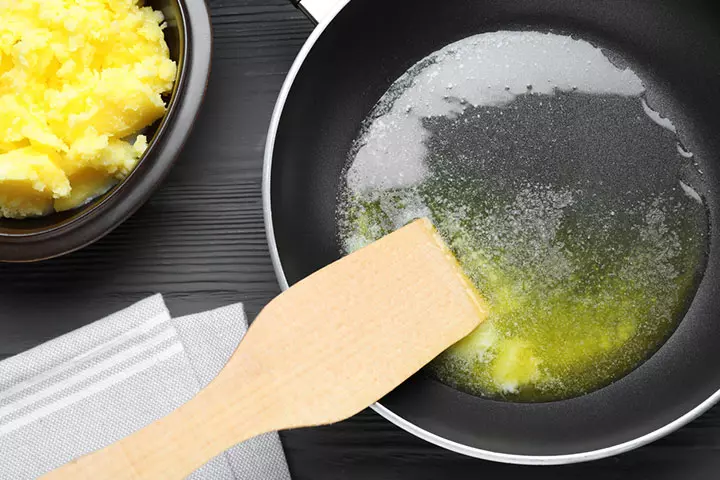
Image: IStock
Ghee is a versatile food and can be used in various ways. Below are some suggestions that you might consider when including it in the baby’s diet.
- Drizzle a few drops on dal or sambar or soup and feed it to your baby. You can add ghee to various baby foods, too.
- Gradually start adding ghee to your baby’s vegetable puree, khichdi, or use it to grease a bread slice.
- Ghee can be used as a cooking medium due to its high smoking point. Cook your daily vegetables and grains in a teaspoon of ghee and let your baby enjoy its benefits.
Making ghee at home can be simple, provided you know how to make it properly. Ria Mathew, a food blogger, shares a simple way of getting homemade ghee from unsalted butter. She says, “Even if you were to make them from organic, grass-fed cow’s butter, it’s much more economical to make it at home, and it only takes about 20 – 25 minutes!”
Going on with her recipe, she instructs, “In a tall, heavy saucepan, melt the butter on medium heat. It will start to splutter and make some noise. When the noise stops (approximately 20-25 minutes), the ghee is ready. You will see a thin layer of foam on top; gently push it aside and take a spoonful of the liquid beneath it. It will be golden yellow. Do not disturb the brown bits at the bottom. Keep it off the heat, and after 15-20 minutes, strain it through a fine mesh sieve into clean bottles (i).”
Frequently Asked Questions
1. Does ghee cause constipation in babies?
No, ghee does not cause constipation in babies. On the contrary, ghee may relieve constipation and regularize bowel movements. It is often used as a laxativeiSubstances that regulate bowel movements and prevent or treat constipation. or ingredient in other laxatives (12).
2. Which color of ghee is considered the best?
The actual color of pure ghee is golden yellow.
3. Is ghee with rice good for my baby?
Yes, the staple cereal of the family should be introduced first to a baby. So, if your staple cereal has been rice, you may introduce it to your baby along with some ghee. Adding ghee will increase the energy value of the food (13).
4. Is ghee safe for babies with milk allergies?
Ghee is made by removing the milk solids from butter and may not be suitable for babies with milk allergies. If your baby has a milk allergy, consult a pediatrician before introducing ghee (16).
Ghee for babies is a health-benefiting dietary fat. The regular consumption of ghee in moderate amounts can support your baby’s growth and development. Moreover, it has promising effects on overall health and well-being in the long run. However, just like butter for babies, excessive consumption of ghee can lead to health issues, such as obesity. Therefore, consult your baby’s pediatrician to understand the right amount of ghee that can be safe for your baby. Lastly, you must be consistent with its use and wait patiently to witness the maximum number of benefits it can provide.
Infographic: Health Benefits Of Including Ghee In Baby’s Diet
Ghee, also known as clarified butter, is a dairy product made from milk frequently used in Indian cooking and herbal remedies. So, if you’re considering including this magical ingredient in your little one’s diet, check out the infographic below to learn about some of the benefits of ghee consumption for babies. Illustration: Momjunction Design Team
Illustration: Amazing Health Benefits Of Ghee For Babies

Image: Stable Diffusion/MomJunction Design Team
Personal Experience: Source
MomJunction articles include first-hand experiences to provide you with better insights through real-life narratives. Here are the sources of personal accounts referenced in this article.
i. Homemade ghee.https://riascollection.blogspot.com/2016/04/homemade-ghee.html
References
1. PalanivelGanesanet al.; Butter, Ghee, and Cream Products; Researchgate
2. Cow’s milk allergy; Victoria State Government
3. Ghee, clarified butter,FDC ID: 343856; Food Data Central
4. Feeding and nutrition of infants and young children; WHO
5. Steven W Ing and Martha A Belury; Impact of conjugated linoleic acid on bone physiology: proposed mechanism involving inhibition of adipogenesis; National Center For Biotechnology Information
6. 9 Health Benefits of Ghee; ECPI University
7. Md M Rahman et al.; t10c12-CLA maintains higher bone mineral density during aging by modulating osteoclastogenesis and bone marrow adiposity; National Center For Biotechnology Information
8. Park Y et al.; Conjugated linoleic acid and calcium co-supplementation improves bone health in ovariectomised mice.; National Center For Biotechnology Information
9. Nilsson A; Role of Sphingolipids in Infant Gut Health and Immunity.; National Center For Biotechnology Information
10. Kalpana S. Joshi; Docosahexaenoic acid content is significantly higher in ghrita prepared by traditional Ayurvedic method; National Center For Biotechnology Information
11. Pallavi Hegde; A case discussion on eczema; National Center For Biotechnology Information
12. Pallavi Hegde; Effective home remedies for constipation; Ayurveda
13. Pallavi Hegde; Nutrition & Malnutrition Resources for India; Mother and Child Nutrition
14. Better Than Butter? Separating Ghee Fact From Fiction.
15. M. Shivananjappa et al.; (2020); Health benefits of ghee (clarified butter) – A review from ayurvedic perspective.
16. Milk Allergy Diet; The Children’s Hospital of Philadelphia
Community Experiences
Join the conversation and become a part of our nurturing community! Share your stories, experiences, and insights to connect with fellow parents.
Read full bio of Jyoti Benjamin
Read full bio of Swati Patwal
Read full bio of Rohit Garoo
Read full bio of Ghazia Shah








